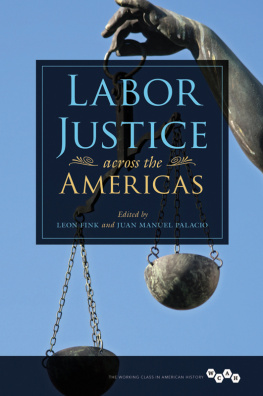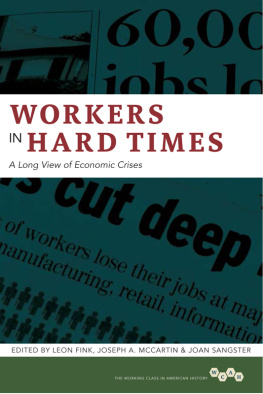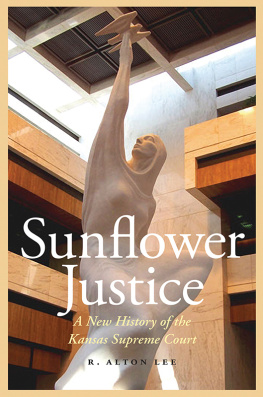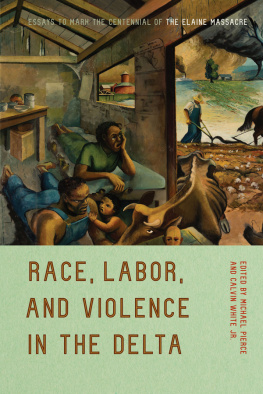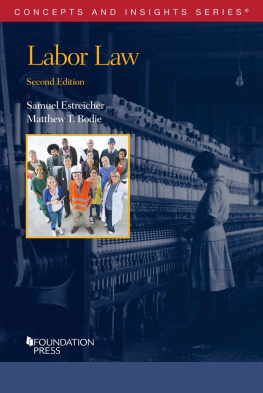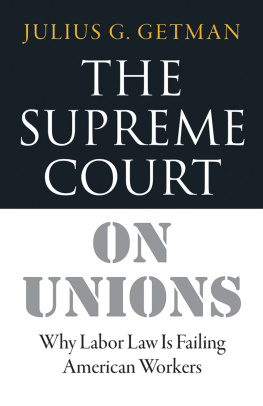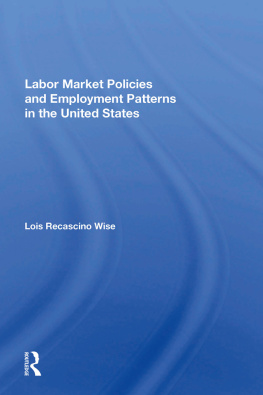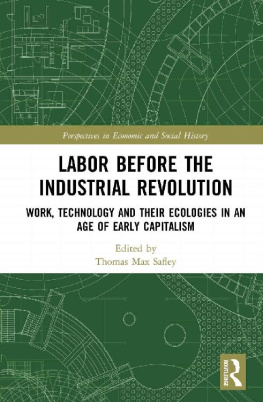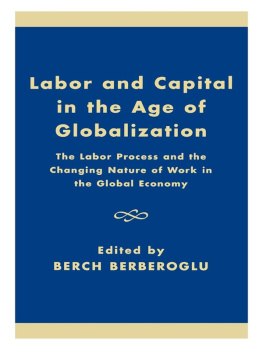2018 by the Board of Trustees of
the University of Illinois
All rights reserved
Library of Congress Cataloging-in-Publication Data
Names: Fink, Leon, 1948 editor. | Palacio, Juan Manuel, editor.
Title: Labor justice across the Americas / edited by Leon Fink and Juan Manuel Palacio.
Description: Urbana: University of Illinois Press, 2017.
Series: The working class in American history
Includes bibliographical references and index.
Identifiers: LCCN 2017031826| ISBN 9780252041501 (cloth : alk. paper) | ISBN 9780252083068 (pbk. : alk. paper)
Subjects: LCSH : Labor laws and legislationAmerica.
Classification: LCC KDZ 432 . L 33 2017 | DDC 344.701dc23 LC record available at https://lccn.loc.gov/2017031826
Acknowledgments
T he inception of this book is closely linked to the Latin American Studies Association. The first exchanges about this project took place at the XXX LASA Congress in San Francisco in May 2012, at the panel, La conformacin de la justicia laboral en Amrica Latina: Mxico, Brasil y Argentina, which was organized by Juan Manuel Palacio and included two of the volumes authors, William Suarez-Potts and Fernando Teixeira da Silva as panelists. The resulting debates inspired subsequent discussions of the project over the following years. Incentive to give this project its final form and complete the team of collaboratorswidening the scope of the initial project to include the United States and Canadacame out of a 2013 Mellon-LASA Seminar Grant. Receiving this grant allowed the authors to hold two workshops that were decisive for the materialization of this book. The first occurred in the XXXII LASA congress in Chicago in May 2014, on the panel, La conformacin de la justicia del trabajo en las Amricas , in which almost all of the collaborators of this book took part; the second occurred the same year at the University of California, Los Angeles, in a gathering genially hosted by Angela Vergara. In these successive meetings we discussed the projects and then the early drafts of what today comprise the chapters of this book. In the extended review process (including translation) required for the preparation of the volume, the editors are particularly appreciative of the penultimate literary examination of the essays by Frank Luce.
Labor Justice across the Americas
Introduction
Labor Justice across the Americas
JUAN MANUEL PALACIO
T he creation of specialized labor courts proved a landmark moment in the development of the legal system in the Americas and composed a central chapter in the process of state formation that occurred across the first half of the twentieth century. Whether considered a tool of co-optation and control of the labor movement and social conflict, a prized means of engendering political loyalty through pro-labor tribunals, a key instrument to apply a legislative program of social reform, or a mechanism for increased interference of the state in industrial relations, labor justice generated a privileged space in the relationship between state and society during the twentieth century. Yet, although the formation of labor courts was a decisive chapter in workers history, it has nonetheless received uneven attention from historians.
This book begins to fill this lacuna with an ambitious proposal: to understand how, when, and why these specialized courts took shape in the Americas in the twentieth century. These questions build on some key facts as well as some assumptions. We know, for instance, that over the course of only a few decades, most countries in the Americas established labor courts for the first time, and that these courts demonstrated notable similarities in terms of their antecedents, the final forms they took in each country, the rhetoric in which they were grounded, their design, and even their names.
The assumptions can be summed up in a single fundamental suspicion: there exist a number of circumstances or processes that explain the appearance of these new institutions throughout the continent and at a particular moment in time. These processes are complex and can be located at the intersection of diverse phenomena, including the rise of the social question at the end of the nineteenth century, growing labor unrest, and the development of new ideas and the emergence of a reformist movement that encouraged labor legislation; all of these factors generated a climate of ideas favorable to social law and state intervention in industrial relations.
The goal of this book thus is twofold. First, it attempts to find common patterns in the fundamental coincidence of the appearance of the labor courts, without falling into determinism or oversimplification, which would elide the particularities of national cases (including their assorted juridical and political traditions). Second, it recognizes the singular and, at the same time, contingent character of these processes in each national context; that is, it addresses the complex set of situations, political circumstances, intellectual currents, and actions and interactions of different actors, which collectively explain the concrete forms that these institutions took in each country.
Labor Justice in Historiography
The subject of this volume lies at the intersection of two strong historiographical traditions, either of which could claim it as their own: labor history and legal history. Nonetheless, until now, neither has fully embraced the topic, and thus it has remained something of an abandoned child, left at a crossroads with no parental field granting it much notice, except in passing.
Legal historians, for their part, have been far more focused on other areas (criminal history or the colonial legal system to name two) and, at least outside the United States and Canada, have largely neglected the twentieth century. It comes as little surprise, then, that they have not paid significant attention to the rise of labor legislation and justice, which has thus remained in the hands of lawyers interested in history or in the pages of old legal histories. There are a few notable exceptions to this rule, but even in these casesworks that have specifically studied social and labor legislation of the twentieth centurythe place granted labor justice has, until now, been rather marginal.
For their part, too few labor historians have pursued the hypothesis advanced by William Fortbath in 1991 that the law has always been a central part of workers daily life and an inherent part of their identity as such.
Another more recent line of historiographical inquiry that could lay claim to the subject of this volume is the history of the modern state and the formation of Concentrating on the last decades of the nineteenth century and the first decades of the twentieth, this historiography has focused on the growth and transformation of the state and, in particular, the role that expert elite bureaucrats (doctors, economists, lawyers, and high state functionaries) held in the process, as well as the contradictions and complexities that guided state action and public policy. Nevertheless, this literature has not paid significant attention to the creation of labor courts, even though they introduced a new category of expert functionaries, which included labor judges, court staff and aids (secretaries, experts, labor doctors), inspectors, statisticians, and mediators, among others.

